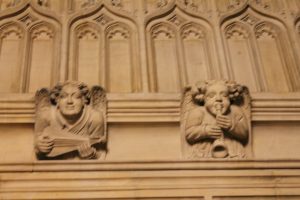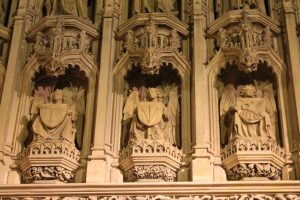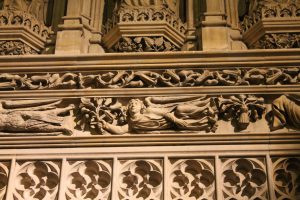Sermon preached by Rev’d Dr Emma Pennington in the Chapel of Magdalen College, Oxford on Sunday 29th October.
Readings: Ecclesiastes chapter 11 and 2 Timothy 2:1-7.


 One of the many things which I love about this Chapel of Magdalen is its angels. You can’t sit in this sacred space for very long, before you begin to find angel after angel, carved in stone around you. There are angels flying along the walls bearing the lilies of William Wynflete, angels welcoming you with silent music as you enter and leave the inner chapel, angels supporting the base and crowning the top of springing columns of stone, angels presenting the symbols of the Passion carved on elegant shields and angels accompanying the figures of Mary Magdalen and Christ themselves at the focal point of the buidling. Unlike the ethereal beings of John Donne’s metaphysical poem Aire and Angels which can only be manifested in the purest of the four elements, the angels of Magdalen have become embodied in the heavier element of stone. It is as if the craftsmen of the Chapel have sought to capture these divine messengers who flit between the world of air and earth, the divine and corporeal, the realm of the unseen and the seen and seek to solidify them into an eternal visible presence amongst us.
One of the many things which I love about this Chapel of Magdalen is its angels. You can’t sit in this sacred space for very long, before you begin to find angel after angel, carved in stone around you. There are angels flying along the walls bearing the lilies of William Wynflete, angels welcoming you with silent music as you enter and leave the inner chapel, angels supporting the base and crowning the top of springing columns of stone, angels presenting the symbols of the Passion carved on elegant shields and angels accompanying the figures of Mary Magdalen and Christ themselves at the focal point of the buidling. Unlike the ethereal beings of John Donne’s metaphysical poem Aire and Angels which can only be manifested in the purest of the four elements, the angels of Magdalen have become embodied in the heavier element of stone. It is as if the craftsmen of the Chapel have sought to capture these divine messengers who flit between the world of air and earth, the divine and corporeal, the realm of the unseen and the seen and seek to solidify them into an eternal visible presence amongst us.
As the darkening days of October give way to November it is these angels which increasingly people the Chapel. No longer can we see the saints in glass through which the light of the spring and summer days shine their presence amongst us. They have now all but disappeared into the blackening night. We are left with the shadowed reflections of mullioned stone and chiselled rock which seek to embody the unseen invisible world of angels all around us. In the next month it will be this hidden unseen world that we will increasingly make real through our thoughts, prayers, music and acts of remembering. On Wednesday it is the Feast of All Saints, when we recall those who have walked this path of faith before us and still inspire us along the way. This is closely followed by remembering those we are bound to through a bound of love which even death cannot break at All Souls. We then give thanks and honour all who have paid the ultimate price for our peace through the sacrifice of their lives on Remembrance Sunday and finally arrive at the culmination of the Kingdom season with adoring Christ as our Lord and King. Each in their own way point us beyond what mortal eye can see to a hidden, invisible world of God’s kingdom so that we through our act or re-membering may embody this kingdom and its values in our own lives. To make the spiritual world as real and tangible through us as the stone angels allow us to touch and see air.
It is this attuning of our eyes to the often invisible realm of the divine that our readings this evening seek to cultivate within us. The Book of Ecclesiastes is a piece of wisdom literature that was popular in the Near Eastern countries in Old Testament times but can seem to us a rather disjointed collection of thoughts and sayings and observations on life. But the theme of Ecclesiastes is singularly ‘modern’. The author simply observes life around him and comes to a set of logical conclusions. This is life under the sun as seen and experienced by those who live it and his conclusions are pretty bleak. Life is unfair, work is pointless, pleasure fails to satisfy, achievement is hollow, good living and wise thinking are rendered futile by death. Be realistic, the author of the book tells us, use your innate God given wisdom to read the signs, for life is futile, meaningless, purposeless, empty without God. Look beyond what you can see and experience for God never intended humanity to leave him out of the picture. If we erase him from life then all is vanity, all is hot air, all is futile, all is dead stone. In the final chapter, part of which we heard this evening, the Teacher of Wisdom who was possibly identified with King Solomon the embodiment of wisdom himself, gives us some practical advice about the generous distribution of wealth, prudent management of affairs, careful use of our time, cherishing the good times, not allowing anxiety to warp or diminish what is good and above all remembering the eternal presence of God who is in all, around all and through all. This view of the world is nicely summed up in lines from George Herbert’s poem The Elixir ‘A man that looks on glass, on it may stay his eye or if he pleaseth through it pass and then the heavens espie’.
In our second reading Paul is very clear where we are to keep our eyes fixed and they are very much on the person of Jesus Christ, the embodiment of the heavens, the human face of the divine God. For Paul Jesus Christ is our captain and if we really want to capture the mood of this verse then we can go to no better place than that remarkable film of the late 1980’s Dead Poet’s Society. In a scene which inspired many of my generation to seek to live extra-ordinary lives. Robin Williams plays an inspirational English teacher who invites his class members to call him their captain after the poem by Walt Whitman to Abraham Lincoln. He goes on to quote from another poem by Whitman to inspire them to look beyond the obvious and seek to live a life that matters.
Oh me! Oh life! of the questions of these recurring,
Of the endless trains of the faithless, of cities fill’d with the foolish,
Of myself forever reproaching myself, (for who more foolish than I, and who more faithless?)
Of eyes that vainly crave the light, of the objects mean, of the struggle ever renew’d,
Of the poor results of all, of the plodding and sordid crowds I see around me,
Of the empty and useless years of the rest, with the rest me intertwined,
The question, O me! so sad, recurring—What good amid these, O me, O life?
Answer.
That you are here—that life exists and identity,
That the powerful play goes on, and you may contribute a verse.
For Paul and for we who have cultivated the eyes of wisdom this verse which we are invited to contribute to the powerful play of life is not so much about us but of what we reveal of ‘the good amidst these’, of the way we embody Christ in and through what we say, how we act and the manner in which we conduct our lives. In an age when to say you believe in Christ is becoming an increasingly counter cultural confession, we are invited to look within and beyond the world around us and amidst its seemingly futile, unjust and pointless ways to boldly declare the authority and divinity of Christ who gives hope to those despairing, comfort to the anxious, equity to the poor and marginalized and purpose to our lives.
In one of my parishes, St Mary’s in Garsington, you will also find angels carved in stone. It always surprises me just how many people drop into this beautiful twelfth century church set on a hill. The view of south Oxfordshire from its door reaches so far that it cannot but alter the focus of your eyes and change your perspective, widening, deepening and extending it beyond the horizon. So it is within the church, for to see the angels you must first look up and around, observe and see with your eyes of wisdom, if you don’t you may very well miss them and their divine message to you in the darkening gloom of these increasingly wintry days. Amen.